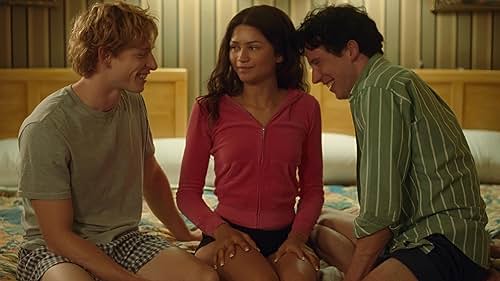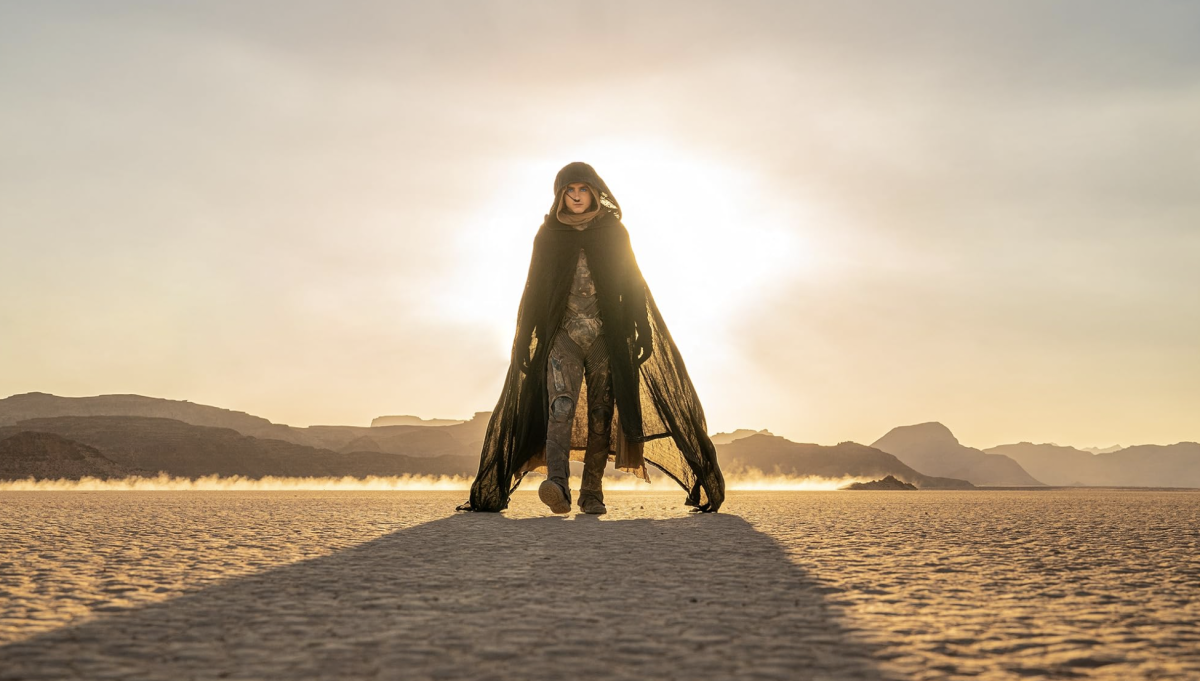At several points throughout Luca Guadagnino’s tennis drama “Challengers,” a pulsating electronic score nearly overpowers the characters’ dialogue. Falling somewhere between the house music of the ‘90s and the instrumentals of Nine Inch Nails’ “Pretty Hate Machine,” Trent Reznor and Atticus Ross’ score feels like mainlining sexual tension.
With this fight for dominance in the sound mix, Guadagnino sends a clear message: the movie’s conflict exists beyond words, becoming something more primal, but ever more engrossing. The result is a thoroughly engaging ménage-à-trois that hits the exact right amount of scandalization. Sex has rarely sold so well.
“Challengers” is a movie about dueling competitions. One is a tennis match between tennis superstar Art Donaldson (Mike Faist) and college grad has-been Patrick Zweig (Josh O’Connor). The other is far more complicated, a years-long competition between Donaldson and Zweig for the attention and affection of rising star Tashi Duncan (Zendaya). The film opens on the tennis match between Donaldson and Zweig while Duncan watches from the stands, allowing the complicated backstory of the trio to unfold in a series of flashbacks.
Beyond the infectious score, the first thing you notice about “Challengers” is its propulsive and dynamic visual style. Though the real plot of the movie revolves around personal relationships, Guadagnino shoots the many tennis sequences with a level of energy that hasn’t been seen in any sports movie in years. He shoots the games from the stands, from the court, from under the court looking up; in the final sequence he places the audience as the ball itself, zooming from end to end at an almost cartoonish speed. The sheer variety of shots is enough to induce a joyous delirium.
Guadagnino, the director behind “Call Me By Your Name,” 2018’s “Suspiria” and “Bones and All” has also become this century’s foremost voice in the cinema of sensuality. Though his stories may feature heightened genre elements, his cinematic eye is uniquely suited to finding hyper-specific details of desire. There’s nothing chaste or innocent about his movies; his camera leers at the bodies of Zendaya, Faist and O’Connor as if they were each their own landscape, holding entire stories of self-image, strength and loss across their skin. Almost shockingly, there are only brief sex scenes, Guadagnino generating tension with a more conversational air.
Rarely is there a moment without the core trio of characters. Justin Kuritzkes’s screenplay is keenly focused on the evolution of their relationship. Starting from Donaldson and Zweig’s college days, we see their (often physical) inseparability in contrast to the steely competition present in the bookended tennis match. It seems beyond friendship, though they’d never admit it. They jointly court Duncan as a unit, already placing themselves as opponents. When Duncan takes the step to meet them at their hotel room, they seem shocked to find that she is interested in both of them. So sets in motion the years-long conflict of the film.
This focus is a tall order for the three lead actors, and they thoroughly deliver. This is by all accounts a star vehicle for Zendaya. “Challengers” allows her to flex all of her acting muscles, playing someone who came from immense promise, had it all taken away from her and now must live vicariously through others, as much as she may resent it. It’s a juicy role that combines the fierce hope of Serena Williams with the resentful conniving of Marquise de Merteuil, while lending her a genuine sense of humanity that you want to see win out over it all.
Faist and O’Connor play two sides of the same coin. Faist acts as a gifted player who hit it big after a series of sacrifices, and O’Connor as a promising player whose career never took off in quite the same way. Faist’s Art Donaldson is always cool-headed, or does his best to appear so. Faist’s sharklike gaze looks stoic, but it also holds the possibility of total breakdown at any moment. O’Connor’s Zweig is determined to poke the bear at any chance he gets. He’s eager to take the chance that may put them both at risk. O’Connor highlights the bro-ish sense of invincibility that of course crumbles before personal criticism. In many ways, their interplay is more complex than with Zendaya.
The film’s flashbacks are abundant and not exactly in chronological order. You’d be forgiven for getting lost in the assortment of “3 days later,” “5 years before” and “12 hours earlier” title cards that delineate them. Thankfully, “Challengers” is happy to let you coast on the pure energy radiating off its cast. Even if you can’t place the timeline, their journey is clear, making the film’s finale pay off like an Agatha Christie story, a deluge of little clues adding up to a climax (pun only slightly intended) of remarkable proportions.
Above all else, “Challengers” is a triumph of directing. Guadagnino takes a taut script and knows exactly what elements to amplify to the point of ecstasy. It’s a melodrama injected with the overt sexuality that has been sorely lacking from adult blockbusters of the last 20 years. By the time it’s over, you might just want to pick up a tennis racket again.
Thomas Machacz can be reached at [email protected].




















